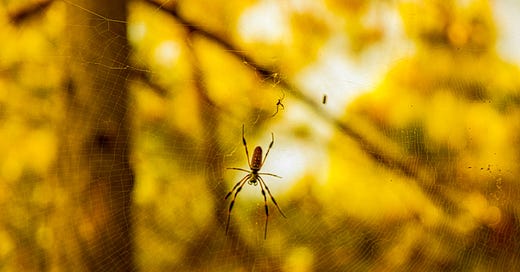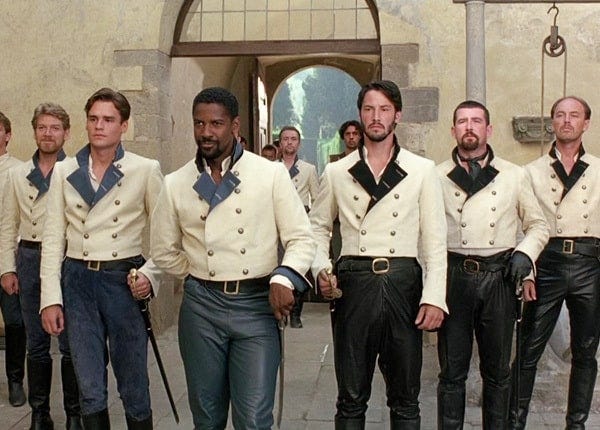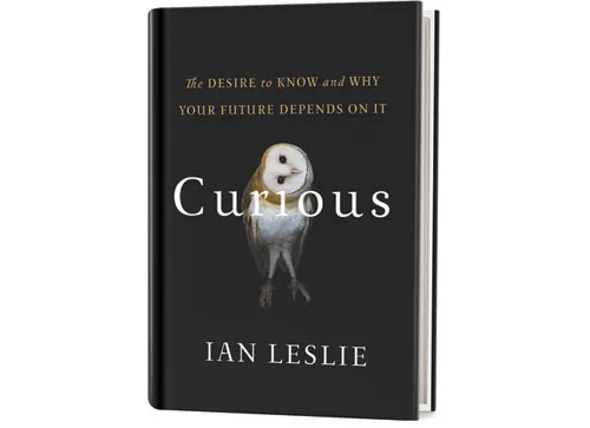Think:
Several years ago, I discovered a series of trails that run through Hammocks Beach State Park near my home. It has become my Sunday morning ritual to arrive as soon as the park ranger opens the gate and walk the trails that wind through the pine forest bordering Queen Creek and the intercoastal waterway. Although the seasonal change is less dramatic than it would be in other locations, I am always fascinated by what I discover, and the transformations from week to week.
This time of year, branches hang heavy with clusters of bright purple American beautyberries, ringless honey mushrooms sprout in clumps from every fallen log, and the Golden Orb Weaver’s webs are everywhere.
The Golden Orb Weaver is a big spider, and its web is huge. The downside of being the first guy at the park in the morning means I eat quite a few of them (webs, not spiders). The upside is that there is no one else around to watch me dance, spit, swat, and swear when I do.
But John, what does a massive spider’s web have to do with turning our passion into our purpose?
Before I get into that, I was recently reading a book I enjoyed until the author began discussing the power of manifesting, (In case you haven’t been let in on the secret, the idea is that if you want something hard enough, it will come true.)
Since our streets are not crowded with children on ponies, I am not putting much stock in the idea.
But what I do wholeheartedly endorse is the power of curiosity.
Unleashing curiosity on our passions is like spinning a gigantic web.
We make connections that we haven’t made before because we are paying attention.
Things that would otherwise pass us by stick to our webs.
When we get curious, we want to share it and we quickly find like-minded people and opportunities, often right under our noses, that we hadn’t known about.
All because we dusted the cobwebs of old thinking and complacency out of our heads and have spun a sticky new spiderweb of curiosity.
Commitment to curiosity drives the search for knowledge, the search leads to discovery, discovery to opportunity, and seized opportunity, to purpose (the thing the world needs).
I have always found it interesting that while we say, ‘curiosity killed the cat’, the cat also ‘has nine lives’. Coincidence? If so, I would gladly sacrifice several lives on the altar of curiosity.
But, the curiosity saying has changed over the years.
It used to mean the opposite.
One of the first recorded versions of the saying is found in the play, Much Ado About Nothing when Claudio utters,
"What, courage man! What though care killed a cat, thou hast mettle enough in thee to kill care."
So, according to Mr. Shakespeare at least, it was care (caution), not curiosity that killed the cat.
So, feel free to get curious without fear.
Read:
Curious - The Desire to Know and Why Your Future Depends On It
By Ian Leslie
“The Only reason people do not know much is because they do not care much. They are incurious. Incuriosity is the oddest and most foolish thing there is.” - Stephen Fry
Write:
Rita Dove has said, “Poetry is language at its most distilled and most powerful.”
I like poetry. And though it seems to have fallen out of fashion, I like rhyming poetry. The genre I most love is called Carpe Diem poetry. These are poems that urge us to seize the day. They instruct, motivate.
Poems, like my favorite, Rudyard Kipling’s ‘IF’ that school children once memorized and recited.
And so, on the topic of curiosity and in the tradition of the Carpe Diem poets I offer this:
Beyond Yonder Rise
What lies beyond yonder rise?
Asked the child with dreams in his eyes
His mother answered, “No one knows
You’ll stay with me, here below.”
What lies beyond yonder rise?
Asked the boy with adventure in his eyes
“There are dangers there,” the elders said,
“We remain where it’s safe instead.”
I wonder what lies beyond yonder rise.
He asked his own reflected eyes
If no one’s been then no one knows
But I will be the first to go.
I must know what lies beyond yonder rise
He told his mother’s pleading eyes
And though she begged him remain at home
He shouldered his pack and then was gone.
They watched him crest yonder rise
Beyond which he could not hear their cries
They condemned him for he broke their rule
Spat, and cursed him for a fool.
Once he crested yonder rise
Unseen sights filled his eyes
Mountains, meadows, prairies, plains
He knew he would never be the same.
He continued on beyond each new rise
New stars shone in each night sky
New dawns greeted morning sun
With each new sight, he thought, press on.
Until beyond the final rise
Blue sea met a bluer sky
“At last I know.” Now truly free,
“What lies beyond yonder sea?”
Repeat:
Thoughts worth repeating from those who said it best:
Curiosity is lying in wait for every secret. -Ralph Waldo Emerson
Curiosity is as much the parent of attention, as attention is of memory. - Richard Whately
Once we believe in ourselves, we can risk curiosity, wonder, spontaneous delight, or any experience that reveals the human spirit. -E. E. Cummings
Creativity flows when curiosity is stoked. - Neil Blumenthal
If there’s one thing I’ve learned in my life, it’s that curiosity might kill cats, but it doesn’t kill people. - Tracy Morgan
If you're still reading you may find this bit of dialogue from Act 1 Scene 3 of Romeo and Juliet of interest:
Tybalt – “What wouldst thou have with me?”
Mercutio – “Good king of cats, nothing but one of your nine lives.”
As always, I’d love to hear your thought, comments, suggestions, or just what you are curious about.







